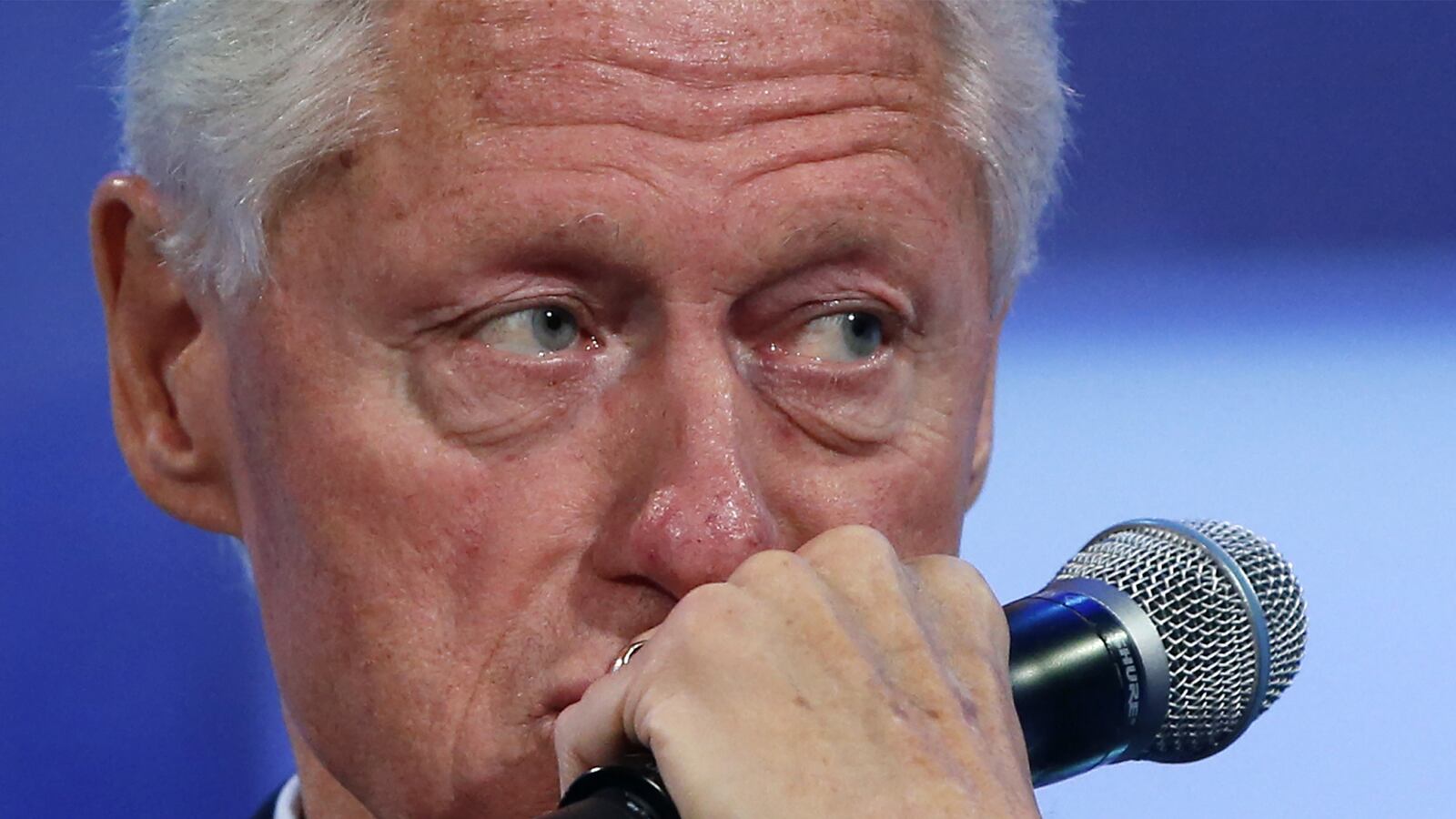When Bill Clinton was storming across the country for Barack Obama in 2012, there was little doubt he was the weapon the nation’s first black president sorely needed.
Reprising his Big Dog role, as the folksy uncle with an endearing will to dominate, Clinton was in his element, swaggering into battleground states as the working class white warrior, rebutting Mitt Romney at every turn. There was rarely a second guess about whether Clinton should’ve been unleashed and unbound. He was too talented to stash away at Chappaqua. But just four years later, his party may have passed him by.
Though he’s five years younger than Bernie Sanders, Bill Clinton can seem like a diminished presence, frail and often hoarse on the stump. But listening to the winding speech he’s been delivering for 12 days now on behalf of his wife—one that digresses at length into a defense of his own eight years in the Oval Office, which ended nearly 16 years ago—the issue may be less that the old great has lost something on his fastball, but that he no longer relates to the Zeitgest of his party.
Speaking to a sympathetic crowd of workers from the state’s potent 1199 SEIU Healthcare Workers Union on the first day of his speaking tour in a placid, concert hall-like venue in Manhattan, the crowd was more audible than Clinton himself, murmuring and milling about as he spoke.
About five minutes in, he started telling them about "this little website which is a goldmine called Politifact where they check whether what you say is true or not. They said of the candidates in the race, she has gotten the highest ratings for being accurate in her statements."
From there, he went to Chelsea to deliver much the same remarks to members of the Building Trades union. Here, his microphone was louder and the room was smaller but the lines were almost all the same, delivered with the same nonchalance of a politician who assumes his audience is always going to be with him.
"Why is this a wacky election?" Clinton rhetorically and bemusedly asked about 15 minutes in. He referenced the 9/11 first responders in the room and the tales people in Rochester, Albany, Buffalo, and Syracuse could tell about his wife, from her term-and-change as a senator in the state that ended nearly a decade ago. "They all have a story," he concluded. And everyone in the room already knew it.
But if they do, those are old stories.
“He’s a different person,” said Hank Sheinkopf, the veteran New York lobbyist and political consultant who served as a Bill Clinton campaign aide in 1996. “He’s thinner, he’s less jovial. He’s much more serious … the devilish look in his eyes, that great smile, it’s missing.”
After eight years of President Bush, there was a clear case for Bill Clinton to make on his wife’s behalf. If presidential campaigns are ultimately about selling a product to the American people—first woman president, steward of Obama legacy, she’ll get things done—Bill Clinton’s role makes a lot less sense. A former president constantly campaigning for an aspiring president will always be a reminder, no matter his good intentions, of the past, and not the candidate’s vision. It will perpetually be the Bill Clinton Show, which is now a distraction as much as a draw. Winning candidates (just ask 1992’s Bill Clinton) pitch themselves as change agents ready to make some kind of break from the past. In 2016, Bill represents the ghost Hillary must exorcise.
“In the early stages he was very effective. But the more it became about Bernie versus her, that became the narrative, and he’s definitely very diluted now as a surrogate,” said Bill Hyers, a roving Democratic operative who most recently managed Martin O’Malley’s presidential campaign. “He isn’t the best person to talk about progressive politics. He’s just not.”
Toni Morrison once called Bill Clinton America’s first black president because of the rapport he had with African-Americans, and his ease was evident when Clinton was on his game Monday, dinging Sanders during a speech he delivered at a predominately black Brooklyn church. “Sometimes in this primary I get the feeling that the gentleman who’s running against Hillary is running harder against President Obama and me than he is against the legacy of the Bush administration,” Clinton said, the old wry grin on his face. “You know, after he’s been a Democrat a little while longer he’ll get used to it.”
Sanders is a self-described democratic socialist and an independent who openly admits he’s running in the Democratic primary for convenience. He is giving Hillary Clinton a potent challenge largely because he has spent years disavowing the traditional party politics her husband stood for. Two decades ago, mocking a socialist as a fake Democrat was a crisp attack line. In 2016, what does it get you?
And even at the church, Bill Clinton’s references to current affairs suggested a beleaguered understanding of the world now.
"San Bernardino was produced from the social media," he said at one point, referencing the connections between the ISIS attack and online radicalization. “You could put up a wall across the Canadian border. You could put up massive sea walls along the Pacific and Atlantic coasts. You can’t keep the social media out. The real battle for our future is going on inside the brains of four billion people.”
The one time in the past week that Clinton seemed like his old self didn’t end well, to put it mildly. After two protesters challenged him over his support for the Violent Crime Control and Law Enforcement Act of 1994, which critics now call a pivotal moment in the mass incarceration of young black men, he pointed to “gang leaders who got 13-year-old kids hopped up on crack and sent them out on the street to murder other African-American children” before reluctantly backing down a day later, presumably on orders from his wife’s campaign, amidst much outrage about his language evoking barely adolescent “superpredators” in black communities.
As the crowd moved the protesters out, Clinton pivoted and referenced a picture he said he was looking at that very morning of Tanzania: “I’ll tell you another story about a place where black lives matter: Africa."
If Bill Clinton’s legacy was tugging the Democratic Party rightward in an effort to help it win elections again, that was a defensible strategy, given the dominance Republicans had shown. But under President Clinton, as any liberal will remind you, welfare benefits were slashed, criminal penalties for nonviolent drug offenders were stiffened, Glass-Steagall was scrapped, traditional marriage was zealously guarded, and free trade came to North America.
“He’s a liability in the primaries because he’s seen as representing a more conservative version of the Democratic Party,” said Larry Sabato, a professor of political science at the University of Virginia. “On the whole, though, I’d much rather have him than not. His name is golden among older Democrats.”
But after the leftward lurches by Howard Dean and John Edwards, Obama’s 2008 triumph, Occupy Wall Street and Sanders surge now, we are now witnessing perhaps the most unabashedly progressive Democratic Party of anyone’s lifetime. Even Franklin Roosevelt had to contend with the Southern Democrats; in 2016, they are an endangered species. Clinton, a former Democratic governor of Arkansas, is one of them.
The fundamental question of the Hillary Clinton campaign, no matter how successful it may ultimately be, will be how it reconciles the Clinton past with the obvious future. Her actual platform is not a lot less liberal than Sanders’s, as her progressive supporters will gleefully point out. She is saying all the “right” things, or at least what the moment demands of her. Criminal justice reform? Check. Marriage equality? Check. Tackling student debt? Check again.
And here Bill Clinton, with his own legacy to defend, is proving a flawed messenger.
“I thought he was running for reelection rather than campaigning for his wife,” Rep. Charlie Rangel, a long-time ally of both Clintons, told Politico after spending a day introducing the former president at three speeches.
Were Bill Clinton not her husband, and just a former president, distancing herself would be simple. Centrism is fading, and its death rattle can still be heard from its last great champion. Hillary the political operator would know when to pull the plug.
“It’s a very different time,” Hyers said. “I think there’s a base of us out there that just don’t trust the Clintons.”






